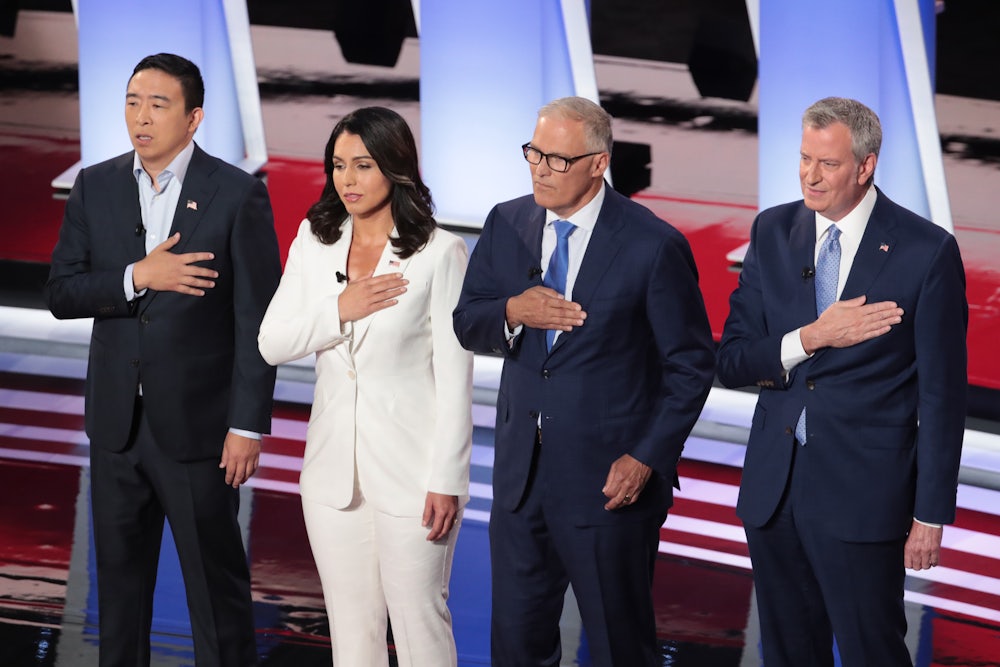Pity the poor optimist who was hoping to see Joe Biden or Kamala Harris tested on a core component of the job they’re seeking. The president of the United States, as the country’s primary representative abroad, commander of the armed forces, and overseer of all ambassadorial relations, has extraordinary power to shape global affairs. But on Wednesday night, as in the past three debates, a shockingly small portion of time and questioning was given over to matters of foreign policy.
Shunted to the final quarter on both nights, foreign policy questions largely focused on two classic bugbears of the early 2000s: Afghanistan and Iraq. When will troops leave Afghanistan? Was Biden wrong to vote in favor of the invasion of Iraq in 2002? The topics—increasingly treated as the twenty-first century’s original sins of foreign policy—aren’t unimportant, but they’re only a fraction of those that should be asked of any presidential hopeful. And seventeen years on, how a politician voted on the Authorization for Use of Military Force Against Iraq is starting to seem a bit academic.
Indirect foreign policy talk through trade and immigration questions failed to result in deeper debate. Discussion on Asia was limited Tuesday to asking candidates whether or not they would personally meet with Kim Jong Un—a flashy question, but not a particularly illuminating one for indicating how a politician would approach the complicated issues raised by nuclear proliferation and rogue regimes. This preference for game-show binaries continued with a discussion about whether the U.S. should ever use a nuclear weapon first. Discussion of Iran was limited to a single question Wednesday—directed, bafflingly, to only Andrew Yang and Jay Inslee, who have clocked in at tenth and fifteenth in the opinion polls, respectively.
In theory, opening the floor up to vigorous debate on one of the primary foreign policy preoccupations of the present day should have been easy. An open-ended “How, as president, would you deal with the rise of China?” could have led to any number of interesting responses. A candidate might talk about scaling back the trade war or investing in STEM education for global competitiveness. Another might talk about the developing situation in Hong Kong, seeing as news broke overnight that China has been assembling forces on the border—a major crisis that could break out at any moment. The persecution of the Uighur minority, human rights problems more broadly, and how to bring China into discussions about curbing emissions would all have been worthy topics. And there’s a solid case to be made that American reticence on foreign aid recently has opened vast swaths of Asia, Africa, and even Europe to Chinese influence with its Belt and Road Initiative. Should the U.S. start prioritizing aid over arms deals?
Climate change is another urgent foreign policy issue. Do the candidates support the idea of richer countries paying developing ones to preserve their carbon sinks? How should the country prepare for increased international conflict as ecosystems disintegrate and food and water shortages crop up? What strategy do each of the candidates have for dealing with Brazil’s president, Jair Bolsonaro? A right-wing populist who has been compared to Donald Trump, Bolsonaro not only longs for the days of the military junta, he openly favors further exploitation of the Amazon—a rainforest which, if reduced by even another fifth, could wind up releasing some 150 years’ worth of carbon into the atmosphere.
And given the amount of time spent denouncing Trump, surely it was worth asking candidates how they’d deal with a proliferation of Trump-like demagogues and buffoons across Europe, where the U.S. has historically found its strongest alliances. How should the U.S. deal with a post-Brexit Britain? Is it still worth prioritizing NATO as a security structure in the twenty-first century? And is it time to start treating international white nationalism—increasingly linking U.S. groups to those in Eastern Europe, and shooters in one country to ideologues in another—as seriously as we treat international Islamic extremism?
Presidential debates and news media alike often shortchange foreign policy. It’s perceived as drier, too complicated, less interesting to viewers. The irony is that this leaves presidential debates focused on domestic policies that presidents are, in fact, far less empowered to enact. Both rounds of debates so far have spent almost a third of their time discussing health care in particular—a vital topic, but in some ways a far weedier one than foreign policy, and one in which candidates’ personal views are about as meaningful as a mood board.
As Trump has demonstrated to terrifying perfection with his Kim Jong Un summits, bellicose tweets, and withdrawal from the JCPOA, presidents can execute vast shifts in foreign policy relatively unencumbered. Health-care legislation, on the other hand, comes down to Congress, and any president’s plan will be, at best, heavily diluted through the legislative process.
If Democratic voters are to have any idea of the effect their chosen candidate would have in office, foreign policy desperately needs more airtime. And if the next president is to have any chance of guiding the country through the existential challenges ahead, our foreign policy debate needs to move beyond showy hypotheticals and relitigating an earlier decade.
